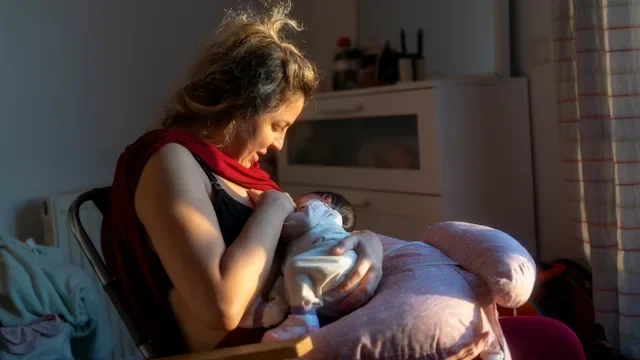Key takeaways:
Tokophobia refers to a deep-seated dread of pregnancy and childbirth. While it isn’t a commonly used term, research suggests that this phobia is on the rise.
There are two main types of tokophobia. Primary tokophobia affects people who have never been pregnant or given birth. Secondary tokophobia affects people who have had a traumatic childbirth experience.
If you’re concerned that you might have tokophobia, talk to a mental health professional. Look for a therapist who specializes in treating women’s issues, phobias, and trauma.
Childbirth is a life-changing experience. Most new moms and dads will tell you that parenthood impacts everything from your relationships to your sleep schedule. So if the idea of having a baby brings up some anxiety, you’re not alone. It’s normal to worry about all the unknowns of pregnancy and how giving birth will affect your mind and body.
But sometimes, fears of pregnancy and childbirth can be overwhelming. Tokophobia is a mental health condition that involves a significant fear of childbirth. Left untreated, it can negatively affect birth outcomes. It can also cause someone to avoid pregnancy and childbirth when they otherwise would have preferred becoming a parent.
How is tokophobia defined?
Tokophobia is a fear of pregnancy, and there are two types:
Primary tokophobia affects women who have never given birth before.
Secondary tokophobia affects women who have had a traumatic experience with pregnancy or childbirth.
Search and compare options
In both instances, extreme worries about pregnancy affect the person’s well-being. These fears often revolve around:
The childbirth experience itself
The baby’s and mother's health
Access to healthcare providers and quality of prenatal care
How having a child will impact family life
Common signs and symptoms of tokophobia
Tokophobia affects different people in different ways. But researchers have identified some common signs and symptoms of this condition, including:
Having an intense fear of giving birth, which often persists despite a deep desire to become a parent
Employing several different contraceptive methods at once to prevent pregnancy
Avoiding discussing anything related to the idea of becoming pregnant
Having pregnancy-related conflict with partners and/or co-parents
Avoiding healthcare appointments or failing to complete blood work related to pregnancy
Requesting a cesarean section when it isn’t otherwise medically necessary
Having nightmares or flashbacks of a previous traumatic birthing experience
What causes and triggers tokophobia?
Tokophobia has not been studied extensively in the U.S. However, some research indicates that tokophobia might be caused by:
Witnessing or hearing about someone else’s birth trauma or pregnancy challenges
Having your own experience of a traumatic birth or pregnancy
Being the victim of sexual abuse
Living with existing mental health challenges such as depression
Not having adequate social or familial support
Not having access to accurate information about pregnancy and childbirth
It’s also important to note the sociocultural factors related to tokophobia. A 2023 study found that the COVID-19 pandemic increased pregnancy fears, especially for:
Black women (who, due to obstetric racism, are three times more likely to die from a pregnancy-related cause than white women)
People who have less access to education
People who have a lower income
People experiencing a high-risk pregnancy
People with prenatal depression
The authors of the study suggest that tokophobia might be fueling inequity in birth outcomes for these groups. They encourage providers to begin screening for tokophobia as part of prenatal care.
How can you manage the fear of getting pregnant?
One of the most challenging aspects of tokophobia is that it often affects people who truly want to have a child. On one hand, you might have a deep desire to grow your family and become a parent. But, on the other hand, you may have intense worries about pregnancy and labor.
While the term might be new to you, tokophobia is more common than you may think. So if you’re fearful of becoming pregnant, here are some things that may help.
Reach out to your loved ones
Talk to friends or loved ones you trust about how you’re feeling. And if someone close to you has already given birth, ask them about their experience. Maybe they also had some pregnancy fears.
Talk with your healthcare providers
If you’re already working with an obstetrician or midwife, talk to them about your concerns. They can help you create a birth plan and choose the best delivery option for your mental health.
Practice mindfulness
Research shows that a mindfulness practice can help reduce pregnancy fears. So make some time to learn some deep-breathing exercises, try a meditation app, or take a yoga class in your community.
Try self-hypnosis
Self-hypnosis can reduce stress during childbirth. But some research also suggests that it can help reduce the fear of childbirth. Talk to your provider or contact your local birthing center to find a class in your area.
When should I talk to my healthcare provider about my fear of getting pregnant?
If your fear of getting pregnant is impacting your life, talk to your healthcare provider. They can provide a referral for a therapist who can help you learn how to manage your worries.
You can also explore online directories or check with your insurance company to find a therapist who who specializes in treating anxiety and phobias. As you review your options, look for someone who treats women's issues, trauma, and/or anxiety.
The bottom line
For many people, pregnancy is a time of both worry and excitement. But people living with tokophobia have chronic, deep-seated worries about childbirth that impact their well-being. Left untreated, tokophobia may cause someone to avoid becoming pregnant even when they desperately want to have a child.
Fortunately, like other phobias, tokophobia is treatable. By working with a therapist, you can learn to navigate your fears, alleviate anxiety, and find a path to parenthood that's right for you.

Why trust our experts?



References
Ahmadpour, P., et al. (2022). Effect of implementing a birth plan on maternal and neonatal outcomes: A randomized controlled trial. BMC Pregnancy and Childbirth.
Bhatia, M. S., et al. (2012). Tokophobia: A dread of pregnancy. Industrial Psychiatry Journal.
Centers for Disease Control and Prevention. (2023). Working together to reduce black maternal mortality.
Delicate, A., et al. (2020). Health-care practitioners’ assessment and observations of birth trauma in mothers and partners. Journal of Reproductive and Infant Psychology.
Güney, E., et al. (2022). Effect of the mindfulness-based stress reduction program on stress, anxiety, and childbirth fear in pregnant women diagnosed with COVID-19. Complementary Therapies in Clinical Practice.
Hildingsson, I., et al. (2017). Presence and process of fear of birth during pregnancy—Findings from a longitudinal cohort study. Women and Birth.
Hofberg, K., et al. (2018). Tokophobia: An unreasoning dread of childbirth. The British Journal of Psychiatry.
Kanellopoulos, D., et al. (2022). Tocophobia and women's desire for a caesarean section: A systematic review. Mædica.
Madden, K., et al. (2016). Hypnosis for pain management during labour and childbirth. The Cochrane Database of Systematic Reviews.
Melender, H. (2002). Experiences of fears associated with pregnancy and childbirth: A study of 329 pregnant women. Birth.
Mind. (2020). Postnatal depression and perinatal mental health.
Nath, S., et al. (2020). The characteristics and prevalence of phobias in pregnancy. Midwifery.
Otley, H. (2011). Fear of childbirth: Understanding the causes, impact and treatment. British Journal of Midwifery.
Rabin, R. C. (2023). Many women have an intense fear of childbirth, survey suggests. The New York Times.
Rúger-Navarrete, A., et al. (2023). Antenatal fear of childbirth as a risk factor for a bad childbirth experience. Healthcare.
Soysal, C., et al. (2022). Antenatal hypnosis: Does it have an effect on fear of childbirth? EJMI.
Thayer, Z. M., et al. (2023). Childbirth fear in the USA during the COVID-19 pandemic: Key predictors and associated birth outcomes. Evolution, Medicine, & Public Health.














